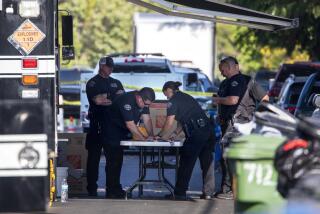McVeigh Prosecutor Cries Over Testimony
- Share via
DENVER — A prosecutor in the Oklahoma City bombing trial cried Wednesday as he questioned a blast survivor about a 3-year-old girl who was killed as she visited her father’s office when the bomb went off.
“I’m sorry, your honor,” Oklahoma U.S. Atty. Pat Ryan said as tears flowed down his reddened face after asking the final question to retired Army Capt. Lawrence Martin.
As jurors watched, Ryan walked back to the counsel table and buried his head in his hands.
The emotional moment came during an otherwise tedious day of testimony about hundreds of pages of phone records that prosecutors say link Timothy J. McVeigh to explosives and the truck that carried them.
Ryan first became emotional when Martin pointed to a poster board with the pictures of the seven Army recruiting office employees killed in the explosion. Martin was blown through a wall into another office and suffered severe injuries that forced him to retire from the service.
Aside from the tears, the day was dominated by 27 phone company employees who were flown in from around the country to authenticate phone records.
They had to appear in person because McVeigh’s lawyers refused to stipulate to admit the records, calling them irrelevant. The judge allowed them into evidence on the condition prosecutors could tie them together.
That onerous task was given to FBI computer specialist Frederic Dexter, who described for the jury the complicated technology behind using a prepaid phone card.
The records came from a jumble of local, long-distance and cellular phone companies--from AT&T; to the Council Grove Telephone Co., a 2,100-line rural Kansas outfit.
Prosecutors contend the records trace the movements of McVeigh as he traveled across the country in the months before the April 19, 1995, bombing and called auto racing tracks, chemical companies, motels, storage facilities and rental truck outlets.
The most important of the witnesses was Trisha Sain of Sprint United Telephone Co. of Overland Park, Kan., who described phone calls placed in Junction City, Kan., five days before the bombing.
That’s the town where McVeigh allegedly rented the Ryder truck that was filled with explosives and blew up the downtown Oklahoma City federal building, killing 168 people. The phone records track calls to the truck rental agency that prosecutors say McVeigh made from a bus station pay phone.
Under cross-examination, Sain--as the other witnesses--said the records merely show telephone numbers and locations of phones and don’t actually show who placed the calls or what was said in the conversations.
These records, according to prosecutors, mesh with the paper trail left by a prepaid calling card McVeigh allegedly obtained through an ad in the right-wing newspaper, the Spotlight.
That card, in the name of Daryl Bridges--which prosecutors say is an alias for McVeigh--was found in the home of co-defendant Terry L. Nichols days after the bombing.
Sources confirmed a CBS News report that McVeigh’s fingerprints were found on money orders used to buy additional time on the calling card. Sources also said handwriting analysts determined that McVeigh filled out the money orders.
More to Read
Sign up for Essential California
The most important California stories and recommendations in your inbox every morning.
You may occasionally receive promotional content from the Los Angeles Times.













